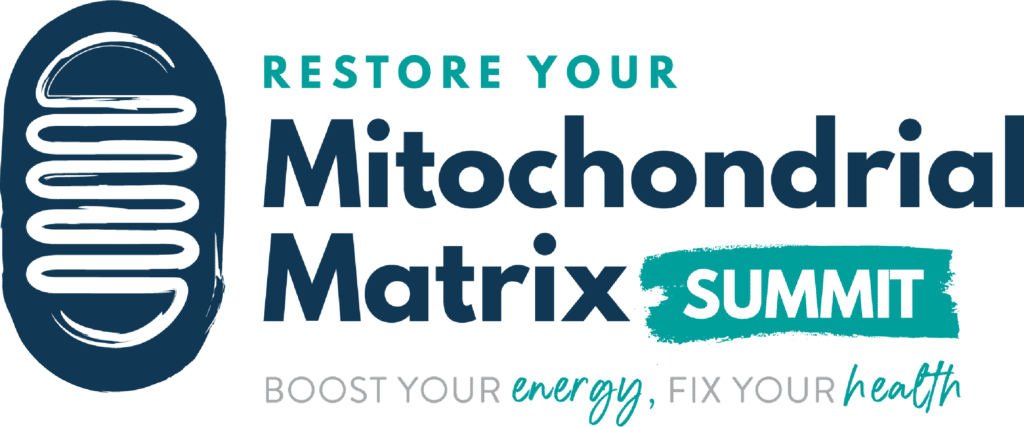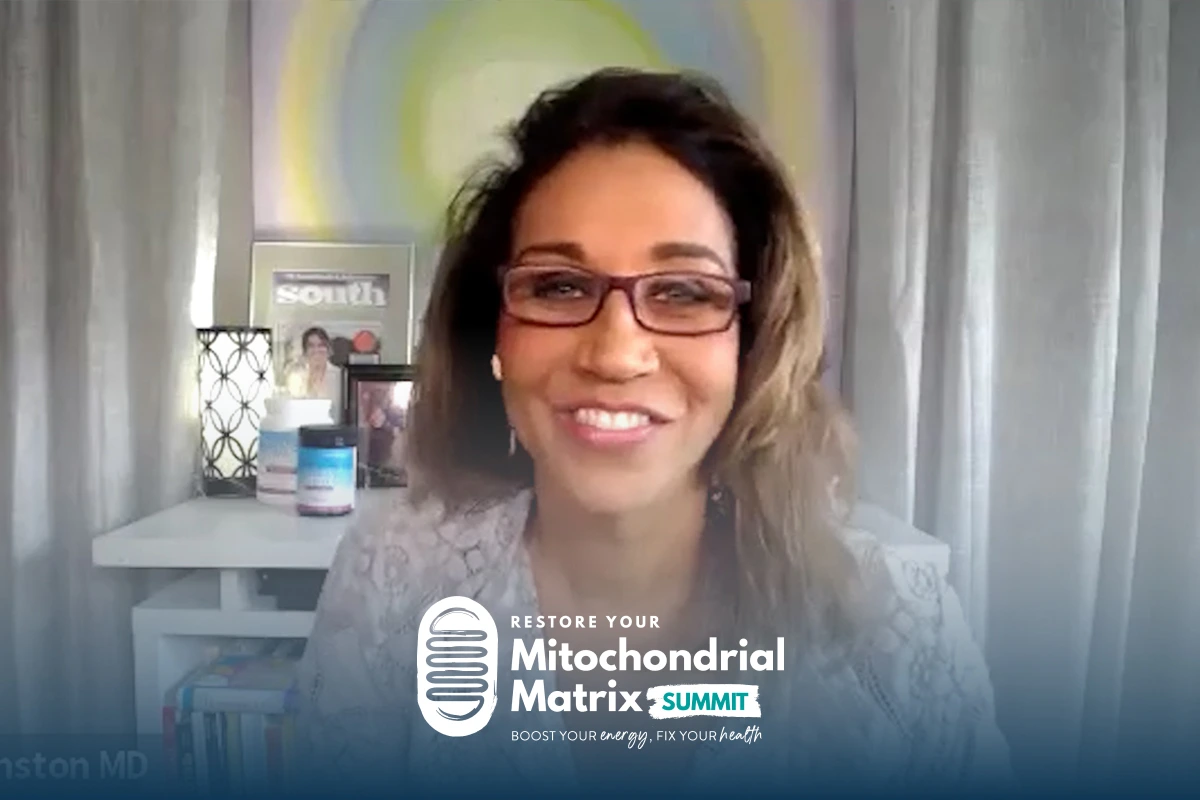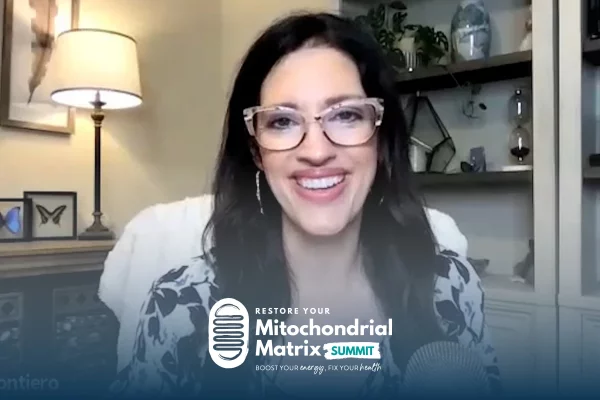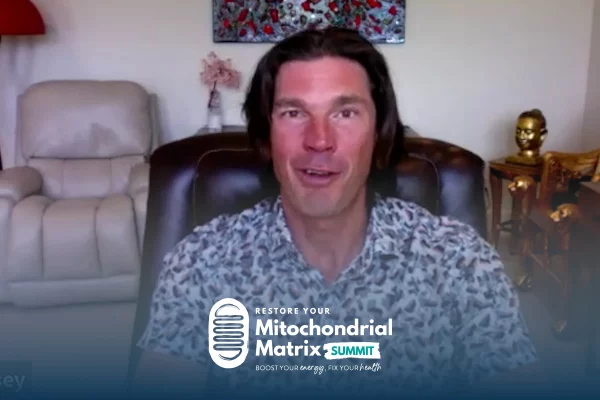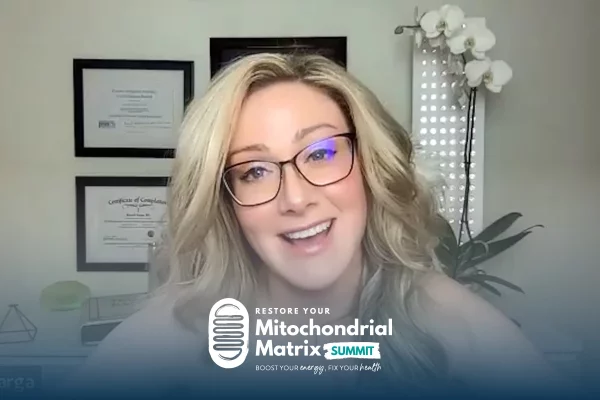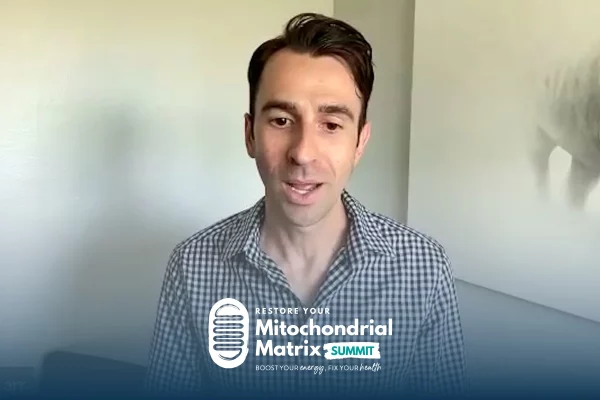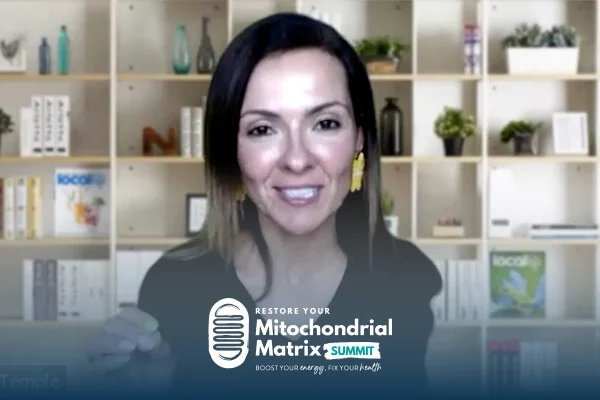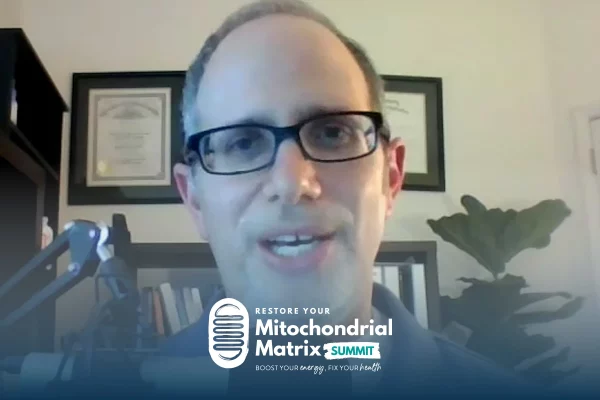Join the discussion below
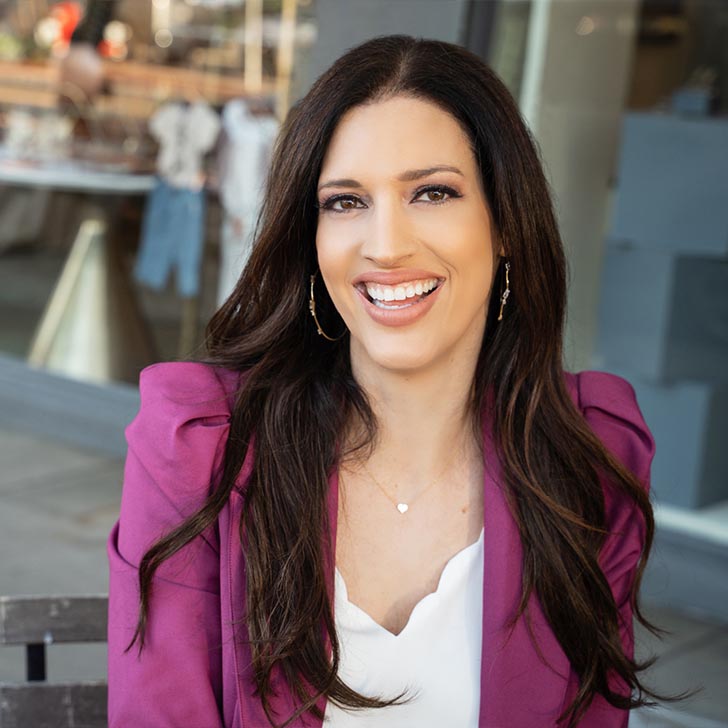
Laura Frontiero, FNP-BC, has served thousands of patients as a Nurse Practitioner over the last 22 years. Her work in the health industry marries both traditional and functional medicine. Laura’s wellness programs help her high-performing clients boost energy, renew mental focus, feel great in their bodies, and be productive again.... Read More
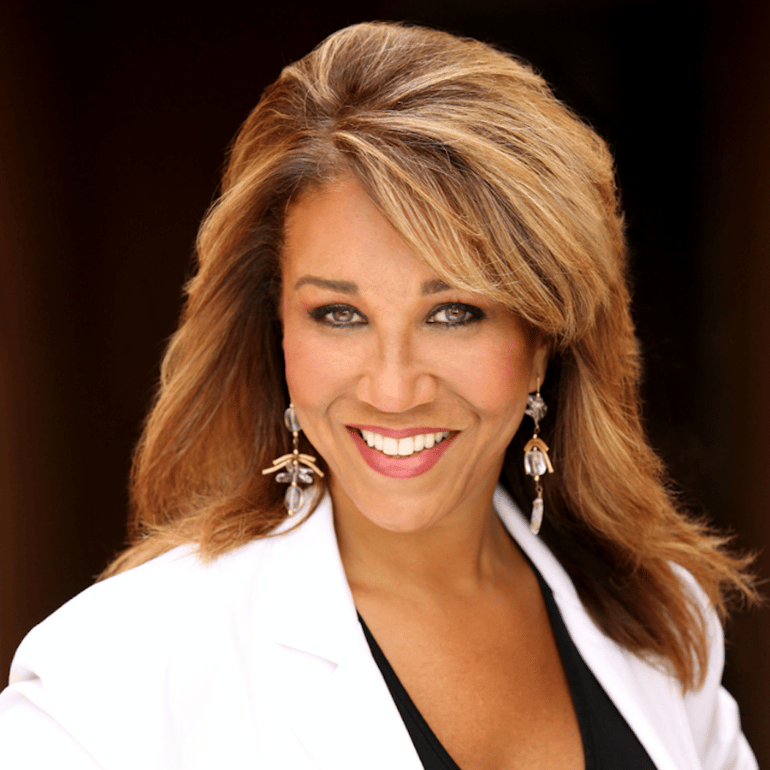
After discovering the hidden cause of midlife weight gain and fatigue in women, OBGYN Dr. Kyrin Dunston lost a life-changing 100 lbs. and fixed her adrenal fatigue. She is fellowship trained in Anti-Aging, Metabolic and Functional Medicine and has practiced this exclusively for over a decade. A pioneer of female... Read More
- Learn how efficient mitochondrial function requires optimal hormone balance.
Related Topics
Adrenal Fatigue, Aging, Antiaging, Brain Function, Energy, Estrogen, Fatigue, Functional Medicine, Health, Hormone Balance, Hormone Health, Hormone Imbalance, Menopause, Menstrual Cycle, Metabolism, Mind, Mitochondria, Mitochondrial Function, Neurotransmitters, Ovaries, Perimenopause, Progesterone, Reproduction, Sex Drive, Sex Hormones, Testosterone, Weight GainLaura Frontiero, FNP-BC
You’re watching the “Restore Your Mitochondrial Matrix Summit.” I’m your host, Laura Frontiero. I’m bringing you experts with fresh ideas and proven methods to help you boost your energy and fix your health so you can build the life you love. And today my special guest is Kyrin Dunston. Hi, Kyrin, welcome to the summit.
Dr. Kyrin Dunston
Hi, Laura. I’m glad to be here.
Laura Frontiero, FNP-BC
Yeah, so good. Now you are an OB GYN doctor and after discovering the hidden cause of midlife weight gain and fatigue in women, you actually lost a life changing, a 100 pounds. You lost a 100 pounds, that’s extraordinary and you’ve fixed your adrenal fatigue. Now you are so incredible. You are a fellowship trained in antiaging, metabolic and functional medicine. And you’ve practiced this exclusively for over a decade and you have a whole bunch of things you do with women. You’re the host of the “Hormone Prescription Podcast,” and you’re the founder of The Hormone Club. And this is to, this is a membership providing women access to state of the art natural hormone therapy treatment throughout the United States. And you also have “The Midlife Metabolism Institute” and that provides education and coaching programs for women at midlife to fix their hormones, their metabolism, and their health. This is a lot of stuff that you do.
Dr. Kyrin Dunston
Yes, it’s a lot. That’s why I have to have my mitochondria in tip top shape.
Laura Frontiero, FNP-BC
Yes, so we’re gonna talk about that today. We’re gonna get all into it. We’re gonna talk about how mitochondria affect your hormone balance. We’re gonna talk about optimal mitochondrial function and hormone balance, and the reason that people at midlife feel tired. And so, we’re gonna jump right into it. So tell me, before we really jump into what hormones have to do with mitochondrial function, tell me a little bit about yourself and your journey and how you ended up here doing this.
Dr. Kyrin Dunston
Sure, great question. So like you said, I’m classically trained OB GYN, delivered thousands of babies, did thousands of pap smears and prescribed birth control pills. And basically did what I was taught as a good OB GYN resident for over a decade. But my health really started faltering. I was obese, at 243 pounds. I was so tired, Laura, that all I had energy to do was go to work and come home and go to sleep. Even though I was a wife and a mom, I didn’t really have energy to participate in life. And maybe women watching at midlife can identify with this among other things, right? I call it the midlife laundry list. My hair was falling out, I had no sex drive. I had gastritis, I had irritable bowel. I had depression, anxiety. I didn’t feel like myself, I didn’t look like myself. I looked 20 years older than I was and I felt like it too. And all my patients who were women in their 40s at the time were having the same problems, right?
And I was doing what I was taught, which is what medicine, what is the diagnosis? What drug do I need to give? What surgery do I need to do to fix this problem? And then when the symptom quieted down, claimed victory. So a woman at midlife would come in, oh, I can’t sleep Dr. Kyrin. No problem, here’s a sleeping pill. My periods are crime scene, crazy, irregular, no problem, here’s a birth control pill straighten that out. I don’t feel like myself. You must be depressed, here’s an antidepressant. I don’t what’s going on with my gut, doesn’t matter what I eat, it’s just not happy. Oh here’s an antispasmodic. So I give them a pill for every ill. And if that didn’t work, eventually they’d end up with a hysterectomy. But despite all this, no woman ever came into my office and said, “Oh my God, Dr. Kyrin, those prescriptions you gave me, that’s surgery you did, amazing. I feel better than I have since I was 20.” It never happened and my health was faltering too.
And I was on all these medications. I never felt like myself. So long story short, I really got curious about what is happening here? And the obvious answer that distinguishes women in that 40 year old age range is the ovaries getting to a certain point where the eggs are old and don’t make the hormones that they usually make. Why are some women suffering and others aren’t? So I became obsessed with this question and I dove deep and I was like, we’ve gotta be missing something. We’ve gotta be missing something. I said that to my colleagues and they thought I was crazy. We’re not missing anything, we’re on top of this. And I’m like, no, 60% of us are overweight or obese by the time we’re 50, that’s not normal or okay. It may be normal and common, it’s not okay, right? The majority of us have chronic fatigue, not okay.
So I dove deep. And what I discovered is that there’s this whole other way to look at women’s health, where instead of treating up in the leaves and branches of health, right? You have migraines, you go to the neurologist over on this branch, you’ve got irritable bowel, you go to the gastroenterologist over here, you’ve got crazy crime scene periods, you go to the gynecologist over here and nobody’s talking and nobody’s connecting. And you end up with a really misshape and tree with branches, banded stuff, and cut off you, go down the trunk of the tree, into the roots in the soil and you figure out why. So you stop practicing what medicine and you go down and you practice why medicine in the roots and branch, roots and soil.
Laura Frontiero, FNP-BC
I love this. I haven’t had anyone explain it like this so far on this summit, what happened is brilliant. You are brilliant. So, what I’m hearing you say is Western medicine is missing it, they’re just solving symptom problems. They’re not really getting down to what’s underneath this. What’s causing the problem, why are we really sick? And what’s extraordinary is you spent all this time in Western medicine doing what you were taught and had this aha light bulb moment like this is just not working.
Dr. Kyrin Dunston
I had that moment. And then I went in the dirt and started digging in the dirt in the roots. So I started learned about all these tests, Laura, that we didn’t learn about in med school, in MD school, where I went there ’cause I wanted to help women to the highest level. I thought I was getting the biggest toolbox only to discover that I had a really tiny toolbox, a powerful one, and you’ll want it if you need it. But a tiny one when it came to answering women’s chronic health problems. So I learned about tests I had never learned about, salivary, cortisol testing and urine hormone, metabolite testing, and functional stool testing and food sensitivity and all this. Anyway, I got in the fellowship program. I was a believer because I lost a 100 pounds in the first two years. And so, started doing this with all my patients because what medicine gets you the standard common things. And you think it’s normal to be overweight and tired as you age and why medicine gets you so much more, gets you vitality at every age. So that’s a little bit about my story.
Laura Frontiero, FNP-BC
That’s such a journey, I love it. So let’s get into the nitty gritty here. And everybody wants to know, what the heck do hormones have to do with mitochondrial function anyway? Because people watching this right now are wanting higher energy. They’re wanting to boost their productivity. They’re wanting to boost their brain power. They’re wanting all aspects of their lives to just be amazing again, like it was when they were younger and everyone knows mitochondria are really important to this process. So hormones and mitochondria have a connection, what is it?
Dr. Kyrin Dunston
Yeah, well, I just wanna say if you’re watching this you’re ahead of the crowd. You said Laura, “Everyone knows it’s part of it.” That’s not been my experience. People are clueless like, mito what? And this is important? In fact, when I do my remote programs with women at the Midlife Metabolism Institute, one of the courses is on powering up your mitochondria and brain and people are like, I don’t need that. I just need my hormones balanced. And I go, yeah, you need that. And I have to educate them on why. So if you’re here, you’re already ahead of the pack. So congratulations. So, what do hormones have to do with your mitochondria? Well, everything. So I think that most women, those watching included, we get this idea and this is how I was taught in my training that the sex hormones, estrogen, progesterone, testosterone are really like this little hormone accessory pack that we women have, create special organs for us to be able to make a life right, a uterus.
And that it’s only about our periods. It’s only about reproduction and our sex drive and really that’s kind of it. And when I went back to school and went in my fellowship, what I learned is that I didn’t learn the truth about hormones in my mainstream training. And that these hormones are really the foundation of how a woman’s body functions. We are foundationally different from men, right? The whole way our brain develops in utero is different structurally. We have certain areas that are much larger and more complex than they do and vice versa, based on our unique makeup of these sex hormones, that’s how powerful they are. We have more of these sex hormone receptors in our brain than anywhere else, which tells you that there are more about our brain and neurologic function than anything else.
Reproduction is not the number one task that they have. So, the first thing that we’ve gotta back up to what of mitochondria have to do with hormones is that a lot of women at midlife know that they have hormone problems. They don’t think they have mitochondria problems, but the data shows that aging is associated with decrease in mitochondria function, mitochondria being our little powerhouses, like I live in Georgia. So Georgia powers my electric company and my mitochondria is like Kyrin’s powerhouse, right? Is what makes my energy for me to fund this economy that is my body and the electricity that comes in allows me to be on Zoom with you, Laura right now. So mitochondria are foundational to what we’re able to accomplish in our lives, right? We can’t think a thought without mitochondria giving us the energy to make the neurotransmitters, to transmit that thought, we can’t snap our fingers without mitochondria powering up the muscles, right, and the neurologic system to coordinate that.
So everything we do is predicated on mitochondria function to energize it. And then your hormones that dictate the whole structure of your brain and you have receptors all over your body for this are what communicate to those mitochondria, that everything’s good do your job and do it to the best of your ability, just like these sex hormones are doing in your brain. So I know I lost some people probably in there, let me back up. So remember when you would go to school in third grade and there would be a substitute teacher and the substitute teacher, she didn’t have the lesson plan. She didn’t know what the homework was. She didn’t know what the expectations for behavior were in the class. And remember how chaos often, quickly ensued in the class, ’cause nobody knew what to do? And people would be running around playing tag and throwing spitballs. And there’d be the kid over at the pencil sharpener, grinding every pencil to down to its nub ’cause he thought that was fun, so no one had any pencils. You know what I’m talking about?
Laura Frontiero, FNP-BC
Yeah.
Dr. Kyrin Dunston
Well what does this have to do with hormones? Well, hormones are your communicators and regulators. They are secreted in your body and go to specialized organs to tell all yourselves what to do when to do it and how to behave and what the homework is. So they’re kind of like the teacher in the class, they’re the regulator. And when they’re out to lunch, the regular teacher, when you’re hormones start decreasing at midlife, ’cause you’re a woman and it’s just programmed that way, you got nobody in charge, it’s a substitute teacher, chaos ensues, none of your cells know what to do. Part of what the instruction they’re looking for is your mitochondria are looking for those hormones going, tell me what to do, tell me how much to do it. Tell me when to stop, tell me when to start. They are the regulators of your mitochondria. So part of the reason why mitochondria function goes down as we age as women is because these regulators starting in our 40s are going down and the mitochondria don’t have the proper instruction that function such a gap.
Laura Frontiero, FNP-BC
Such an amazing description, I think everybody’s got it. This is so good. I mean, when you talk on this super high level of biology, we kind of zone out. Nobody’s gonna forget, nobody’s gonna forget the unruly classroom. Okay, so now we know that hormones are sending messages and they’re regulating and they’re telling the mitochondria what to do. They’re telling the cells what to do. So, and we’re losing it. We’re losing hormones, as we grow.
Dr. Kyrin Dunston
Losing it.
Laura Frontiero, FNP-BC
Right, so what do we do from here? Because I know there’s hope. I mean, you lost a 100 pounds. You fixed your hormones, you got everything communicating and regulating again. So now we know that the connection and how important it is, how can someone fix this?
Dr. Kyrin Dunston
Right and great, great point, Laura. And just wanna mention that there’s data on all three hormones, estrogen, progesterone, testosterone, lots of data, how each one uniquely talks to your mitochondria and is Uber important for proper mitochondrial function and restoring these hormones in animal models and human models improves function, which then improves ATP energy output from the mitochondria and improves all kinds of markers of health. What do you do about it? So you gotta replace your hormones. So humans, we are only one of two species that lives any length of time in menopause, certain species of whales being the other species. Every other species when women have completed their childbearing, they die.
And that used to be the case for us just over a 100 years ago. It wasn’t until 1907 that women actually lived into menopause, right? Average age of menopause is 51, but these changes and decline in hormones start in our 40s, so it starts sooner. I call it hormonal poverty. So just like financial poverty is, you don’t have money to fund your living expenses for what your needs and wants, hormonal poverty is you don’t have the hormones to fund the activities that you need just to feel healthy and be vital and alive, like sleep well and grow hair and think thoughts and be joyful, right? Or digest your food, any of these things. So you start going into hormonal poverty in your 40s, average age, 51, you’re profoundly hormonally impoverished. Now there’s some women that say Dr. Kyrin, I’m gonna do menopause naturally.
I’m not gonna take hormones, it’s a natural phase of life. And I’m just gonna let nature take its course. And I’ll say, okay, fine. Make sure you are educated on the consequences of that choice. I have never met an intelligent woman who when properly educated on the consequences of that choice, didn’t immediately say, “Oh my God, I need hormones and I need hormones now,” why do I say that? Because not being in hormonal poverty for all those years, our average lifespan is 82 at this point. So you could be in there for 40, 30, 40 years, decreased life spam, okay? Most people don’t realize that when you are hormonally impoverished, you are going to die sooner than everybody else. That might be one reason you might wanna take hormones. Increases for neurodegenerative diseases, fancy term for dementia, including Alzheimer’s, which my mom has, advanced case. Her doctor did not treat her hormones and give her hormones.
So for 30 years she had no hormones and now she doesn’t even know who I am. So if giving hormones in some studies has shown a reduction of dementia up to 77%, well, maybe you want them because you don’t want to get dementia. So, the list goes on and on, right? Number one cause a blindness in older women, macular degeneration, lack of hormones increases the risk exponentially. Replacing hormones decreases the risk of macular degeneration of blindness secondary to it by a significant degree, the list goes on and on. Heart disease, number one killer of women over age 50, multiple studies document that hormonal poverty increased risk of heart attack also other cardiovascular disease is stroke. And that hormone replacement improves outcomes. So, okay, you don’t want hormones, but just know the data.
I’ve never had a woman who said, oh, I hear all that and I’m still doing it naturally, but what’s so funny Laura is no woman’s doctor ever said to her, “Look, your bones are a little thin. You got some osteopenia moving towards osteoporosis. We are gonna check your calcium vitamin K levels, all these things and you should replace them. You need more.” No woman ever said I’m doing osteoporosis naturally thank you, I’m not taking all that. So we’ve internalized this negative dialogue that happens in medicine, around women’s hormones. And so, it’s really time for us to unpack that and look at why are we internalizing these kind of misogynistic conversation around women’s hormones? We have no shame taking calcium, ’cause our bones are thin. We should have no shame taking hormones because our brain needs it, because our heart needs it because our eyes need it. There should be no shame in that and no value judgment. I know I’m on a little soapbox here.
Laura Frontiero, FNP-BC
That’s okay.
Dr. Kyrin Dunston
You’ve gotta replace the hormones.
Laura Frontiero, FNP-BC
Yeah that’s okay. Can you, this is a really important point that you’re bringing up and can you speak a little bit into what happened in America? Because everyone was put on Premarin up until the 19 early 2000s, mid 2000s. And I can remember even my grandmother was shamed if she didn’t take it. And so, what happened because the system used to be pro hormones. Now it’s anti hormones. And also what I want you to speak into is what’s the safe way to do this because I know you’ve got some different methods to replacing hormones than you would get in your conventional doctor’s office. So since you went down that soapbox, let’s go with that, keep going.
Dr. Kyrin Dunston
Let’s go with that. But let’s back up just a little bit because why did this become an issue? Anyway, when women started living a certain significant amount of time in menopause in the early 1900s and losing their femininity, some aspiring biochemists and drug companies said, well, we can get their femininity back. And they knew they couldn’t get a patent on naturally occurring substance. So they went and got equilin from pregnant horses, which is horse estrogen. And they gave it to women and the reduction in their femininity was improved. And then they said it was the lecture of life. So they started giving it to all women as they entered menopause. But they were so focused on the femininity aspects, the sex drive, right? That was their big thing. Well then women started getting uterine cancer, right? Because unopposed, estrogen stimulating the uterus predisposes to uterine cancer. So then they said, oh my God, what are we gonna do?
We can’t do this. But instead of just giving the natural compliment to estrogen, which is progesterone and say, oh, this will stop it, ’cause they couldn’t get a patent on that. They said, we gotta make another drug to counteract the effect. So they took progesterone, which naturally is biologically identical to what a woman has, but took it in the lab, chemically altered it so they could get a patent on it and showed that it decreased a woman’s risk of uterine cancer. So, oh, we’ll give both. So that’s medroxyprogesterone acetate or Provera and equilin from pregnant horses which is Premarin. And this was the standard of care all the way through when I went through my residency in the 1990s. And then what happened in the early two 2000s was the Woman’s Health Initiative study done in California, Kaiser on over 15,000 women.
And they were trying to prove that a Premarin and Provera, these synthetic hormones dissimilar to what a woman naturally has had all these benefits, right? So they could even increase the indications more and have more people use it. And they found the opposite. So they found an increased risk of breast cancer. Before five years they stopped the study. They didn’t demonstrate the health benefits that they had claimed. And so, I remember that day walking into my office, the phone was ringing off the hook, women were hot flashing. Everybody was coming off their hormones. The news was like estrogen kills. I mean, literally it was like a feeding frenzy, like no other about women’s health and ever since then, basically all, so the American College of Obstetricians and Gynecologists, the National Endocrine Society, American Academy of Family Practice Physicians, The Menopause Society, right? They all have changed their recommendations on the use of hormones to say basically, no one should use it. If you have to, use it in the lowest dose possible for two symptoms of menopause. And they’re basically like, oh, it’s bad, but there’s been so much data that’s come out since then that basically says the Women’s Health Initiative, one, was a flawed study and their conclusions were wrong.
And that hormones do not cause breast cancer, like they said, or clots and all the other things that there is still benefit for dementia and Alzheimer’s prevention and heart disease, the number one killer of women and that longevity increases and so all this research has come out and they’ve also said, “You were looking at synthetic hormones. You didn’t look at biologically identical,” and there is benefit from that. And we’ve known that for decades, but we don’t have these large scale trials because nobody’s gonna pay for it because you can’t get a patent on a biologically identical hormone. So I know I might have lost a lot of people in there. It’s a complicated issue. There’s a lot of politics associated with healthcare if you didn’t notice that. And part of it is that the companies have to spend billions of dollars to do the research, to meet the FDA criteria, to become FDA approved. And so that skews things a little but there’s a lot of politics.
Bottom line is everything nature gave you when you were born, it gave you because it makes you healthy, right? You’re not born with anything like let’s just assume you’re born with no chromosomal abnormalities, okay? You have estradiol because it makes you healthy. You have certain forms of calcium because it makes you healthy. You have the neuro transmitters you have ’cause it makes you healthy. So first off, the idea that anything that you naturally have is going to turn on you and cause cancer is insane. So some people say, oh no, estrogen causes cancer. Well, if that were true, everyone who has estrogen would have cancer, is that true? No, men have estrogen, they don’t all have cancer. Every woman has estrogen, they don’t all have cancer. It’s not estrogen. It is other problems that predispose you to cause cancer. So I think sometimes we lose our minds because of fear. And we stop thinking. In fact studies show, if we’re triggered into our reptilian brain, that is the fear place, our fore brain, which is our human.
What makes us better as humans is that we have the ability to think and reason things out and not just react knee jerk, but the press hasn’t jumped on the science that’s come out since the Women’s Health Initiative. And unfortunately what I learned after my own health struggles not being resolved in my corporate medical training is that most doctors are not hormonally literate and they don’t get it. And they think that horse estrogen is the same as human estrogen. And they don’t understand that there’s a difference. They’re like, ah, it’s all estrogen. No, it’s not, right? Just like apples are not oranges, oranges or not apples. And if you tell your partner, “Hey, get me some apples at the grocery” and they come home with oranges. You don’t go, ah, it’s all the same, it’s fruit. You go, no, I wanted apples.
They’re different and even our literature shows this. So what is the average woman listening or man listening, who cares about women and is now like, So you want a natural hormone solution that is biologically identical to what you naturally have. The same hormones that made you a female in utero gave you a uterus and gave you a clitoris and gave you the unique anatomy that we have, the same hormones you had in utero that made your brain able to multitask ’cause we’re women and we have that extra part of our brain that men don’t have the same hormones that made you a fertile and able to have children, right, and create life. These keep you healthy, that’s what you want. That’s what you want onboard. And that’s what the studies show with your mitochondria is that these biologically identical forms of hormones positively stimulate them, increase the ATP output, decrease lipid peroxidation, which is a toxic thing that happens in your mitochondria that you don’t want, these hormones improve all of that. So, that’s what you want.
Laura Frontiero, FNP-BC
Amazing, amazing. So just to summarize what you just went through, which was huge. Some key points, there is a big influence in big pharma in what drugs come to market and what we use to treat women menopause. And what I heard you say is there’s no money in the safe stuff. The bioidentical hormones, nobody’s gonna do a study because you can’t patent it. And so therefore, it’s really not taught. It’s not used in mainstream medicine. And the other thing I heard you say is many, many, many people in mainstream medicine just kinda lump all hormones together, whether it’s estrogen from a horse or it’s a bio identical hormone, they’re just looking at that Women’s Health Initiative Study and saying, well, it’s all bad. And I will tell you, I mean, I’ve worked in Western medicine for 20 years.
And I remember when this happened, I was working in an osteoporosis clinic and everybody, estrogen used to be FDA approved for the treatment of osteoporosis. Everybody came off their estrogen and yes, everybody was hot flashing and it was an absolute disaster. And the problem was that Western medicine didn’t have a solution for that. It was like, well, get on an SSRI then. So they sold a whole bunch of antidepressants, right after estrogen was demonized. So now that you’ve educated our audience on the importance of bioidentical hormones and the importance of hormones for longevity and for cognitive thinking and for prevention of disease, what do you do with women? What’s the next thing, what’s the next step?
Dr. Kyrin Dunston
Right, well, proper assessment is key. So this is the other thing that in mainstream medicine, there’s a standard of care for checking everything, right? We check your good cholesterol, your bad cholesterol, your weight, your blood pressure, right? We test everything. But when it comes to women’s hormones, there’s no standard of care for that. We don’t check women’s hormones, that’s what I was taught. We do one size fits all treatment based on symptom management, crazy irregular periods, no hormone testing done, here’s a birth control pill. Oh, you’re hot flashing, must be menopause, here, take this. And you need to back up and go, that’s insane, right? But we are socialized to believe myself included when I went through my training, I was socialized to believe that was okay.
But when I went through my own transition and I learned, oh, you can check one of these hormones. And I started saying, well, wait a minute. Why don’t we check these in the first place we check everything else? It makes no sense, but we just come to accept these things. It’s just the way it is. So you gotta start questioning everything and you gotta get your hormones checked and I’m not talking about a blood test. And that might be a whole other conversation because blood may be accurate for checking some things. But these hormones are made from cholesterol, which comes from animal fat, right? And they’re like oil and your blood is like water. So these hormones are not just swimming around having a pool party in your blood, right? They’re carried around in little carrier proteins, which I call FedEx trucks. And then they’re delivered so rapidly into the cell that it’s very hard to capture an accurate measurement of how many you actually have that are active.
So you gotta look at tests like salivary testing or dried urine hormone testing to get an accurate view. So you gotta have, tests don’t guess to know where you are. And I usually recommend starting, if not in your 30s, definitely in your 40s to see where you are. Don’t wait until you have symptoms. So this is the other thing. You may not have symptoms and can still be in some degree of hormonal poverty and you can be having the consequences of hormonal poverty working on your brain and your heart long before you know it’s an issue. Don’t wait until you don’t know what you did with your keys to do something about this. Because by the time that happens, you’ve gone a long way down the road. So you gotta be proactive, get checked. I think women should have their hormones checked twice a year. I think it should be part like when they’re younger, maybe every year, but then as we get into our 40s twice a year.
So we know when we’re becoming hormonally impoverished and we can get on it. And then you got to get replaced to appropriate levels. Just like if your potassium is three, your doctor doesn’t go, ah, we’ll just watch it. No, they go, “Oh my God, your potassium is three, we need to replace that and get it up.” Same with your hormones, right? Most women become progesterone deficient in their 40s first. And you know, progesterone is the weight loss, sleep well, diuretic, feel good, happy hormone. And this is why a lot of women in their 40s, they can’t sleep, they feel cranky. They’re like, I don’t feel like myself. They start gaining weight, progesterone. So if you are low on progesterone, get a biologically identical progesterone. There are even some over the counter. There are some prescription too, not a synthetic progestin like medroxyprogesterone acetate, Provera that you don’t want. ‘Cause it will increase your risk of breast cancer and these things you don’t want. And then as you age, right, this is not set it and forget it. We humans love to do our little habits. Like I eat this every day for breakfast for 10 years, right?
Laura Frontiero, FNP-BC
Right.
Dr. Kyrin Dunston
Your body doesn’t so much like that. Health, I always say is a journey, not a destination. So you have to be constantly monitoring at least twice a year, in my opinion, and adjusting, especially as you go through what we call the climacteric premenopause menopause, you’re always changing. So you gotta be navigating that, navigating that, adjusting, adjusting. And then in your 50s a majority of us become estrogen deficient as well as progesterone and over half of us become testosterone deficient too. And that’s a whole, even other topic. Testosterone has some very good research on how it affects mitochondria.
It actually increased mitochondrial density and skeletal muscles, which is Uber important for maintaining your weight. ‘Cause one of the reasons we women gain weight is we’re losing skeletal muscle mass. It’s being replaced by fat. So we wanna hold onto that skeletal muscle mass. We want high mitochondrial density and the study showed that the testosterone improves ATP output from those mitochondria equals getting your weight to normal, which is a big problem for all of us. So you wanna test, not guess, you wanna make the smart choice and get out of hormonal poverty with natural hormone therapy. Those are the things you gotta do.
Laura Frontiero, FNP-BC
Now I know people watching right now are just wondering, how can I work with Kyrin? This is amazing, she speaks my language. She makes everything so easy to understand. She’s funny, she’s passionate. How do people get ahold of you? Because I know somebody right now watching is like, I need to work with this woman.
Dr. Kyrin Dunston
Oh, awesome, thank you for that, Laura. Yeah, so I realized last year when I did the “Stop The Menopause Madness Summit,” right? We had like over 50 experts in it with 13,000 women attended, like it was amazing and women are like, I need hormones, I need hormones now. And I didn’t have anywhere to send them. So actually I founded “The Hormone Club,” which is a telemedicine solution for women in the US to obtain natural hormone testing and prescriptions via telemedicine in a membership based program. So it’s thehormoneclub.com.
And since you’re here now, if you don’t tell anyone, we have a special code you can use to get 10% off your initial membership, bliss10, b-l-i-s-s all lowercase one zero. You could use that. And so that’s, if you’re like, I need a hormone prescription, my doctor doesn’t speak hormone. They’re hormonally illiterate, don’t blame them. It’s okay, they were just trained the way I was trained and maybe they haven’t had the chance to go do this extra training. It’s okay, that’s why I created that. And then I also have at my Midlife Metabolism Institute, I have programs where I teach women about the hormones that you don’t need a prescription for. So we have educational programs and hormone balancing, ’cause there are all these other hormones you need to deal with. And mitochondria, gut function, detox that I work with women in that one.
Laura Frontiero, FNP-BC
So good, so good. This has been an incredible interview. Really, Kyrin, I love, love, love how you break this down in such simple terms. At the end of the day, if people can’t understand what you’re talking about, they can’t help themselves, it has to make sense. And you have a gift of making this very easy and making sense. And there’s nobody watching this right now that didn’t have light bulbs go off and now are thinking I better do something about this so I can keep my brain function and live a long life and be disease free and keep my mitochondria working. Is there any last words of wisdom? Like any pearls you wanna drop before we wrap up for today? Because I could talk to you two hours. I mean this could go.
Dr. Kyrin Dunston
Yeah, I mean I would just leave everyone with a call to action. Like I said, my mom is in the end stages of Alzheimer’s. I’ll never forget the day the first time she couldn’t remember my name and I will say this without crying and she doesn’t even know who I am now. And like I said, her doctor was trained in the main stream paradigm, I was, right, no hormones. My mom was the healthiest person that I knew, right? She lived in Manhattan. She walked everywhere, impeccable diet lifestyle. And I believe that not having, living in hormonal poverty for three decades is a big part of this. So I want that to be a warning call. It is too late for my mom. It’s not too late for you. Don’t take this in one ear and go, oh, that was interesting. And go about your life and do nothing because I talk to women all the time, 60s, 70s, 80s, and beyond who get angry, are like, “I wish someone had told me because I probably wouldn’t have been dealing with what I’m dealing with.” So whatever age you’re at, it is not too late for you. Take this as a warning sign, right? We always ask God, give me a sign. This is your sign. Go do something for yourself and share this with every woman in your life, who you care about, super important.
Laura Frontiero, FNP-BC
Amazing, thank you for this, Kyrin and your work is so important to the world. I just acknowledge you and appreciate you so much for everything you’re doing, thank you.
Dr. Kyrin Dunston
Thank you. And thank you for having me and thank you for this amazing summit so we can raise awareness about mitochondria.
Laura Frontiero, FNP-BC
Thank you, all right, take good care, bye.
Downloads
